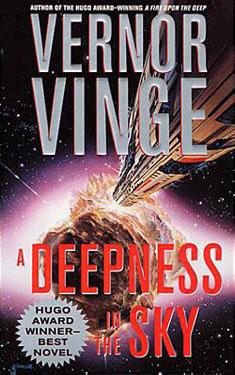Vernor Vinge
Completed 2/15/2014, reviewed 2/15/2014
4 stars
In finishing this book, I achieved two amazing feats. First, I have read all the Hugo Award winners
through 2013, excluding the retro winners.
Second, I learned to like the space opera. While I knew I’d accomplish the first, I
never thought I’d accomplish the second.
“Deepness” is a classic space opera. The Qeng Ho, the ultimate interplanetary
traders, are at Arachna, a planet orbiting a strangely variable star. The star is about to relight, awakening
Arachna’s spider-like sentient race from their 200 year hibernation. Their mission is to make contact with the
spiders and engage them in interplanetary commerce. Another group, the Emergents, have also shown
up with less noble intentions. A war
between the two breaks out, leaving the Emergents the victors but with crippled
ships and a lot of captive Qeng Ho.
Together they must wait until the spiders awake and become
technologically savvy enough to help them restore their ship. Several of the Qeng Ho try to devise a plan
to overthrow the Emergents and protect the spiders from their genocidal intentions.
Woven through the main plot is story of the spiders,
particularly one, Sherkaner
Underhill
When I began the book, I was none too thrilled. As many of my followers know, I’m not a fan
of space opera. The drama between the
Emergents and the Qeng Ho seemed to have a cast of thousands, dry technology
filled with lots of jargon, and very cardboard characters. There was the power hungry Podmaster, the
young, naïve, lovelorn flight commander, and the smart and perky preteen, among
many others. Reading it was a chore,
only alleviated when the story returned to spiders. They were a wonderful alien species right
from the start. This, I thought, is
where Vinge was hiding his good characters.
Then something happened.
After the Emergents beat and basically enslave the Qeng Ho, the story
takes a very different turn. Vinge takes
the time to flesh out the human characters.
He gives them histories, loves, friendships, and motivations. I found myself intrigued with their efforts
to subvert the Emergents. Next thing I
knew, I was riveted by how the plotlines of the Qeng Ho, the Emergents, and the
spiders were all coming together in a fast-paced, explosive finale.
A very interesting concept was how the Emergents enslaved
their foes. It’s called the Focus. It is
basically a virus that the Emergents had engineered out of a deadly plague into
a mind-control device. When properly
introduced and manipulated to its host, this virus turns a person into a
single-minded automaton. A focused
person becomes just that, intensely focused on the task at hand. When properly organized and directed, these
zipheads become organic AI computers networks, finding solutions to problems in
days, instead of years. I found this
concept really intriguing. To me, it was
a fictionalization of what’s happening to our education system today. Schools, from elementary to university, have
become robot factories. Their purpose is
no longer to produce educated critical thinkers, but rather focused automatons
who can get gainful employment but lack the ability to appreciate anything
beyond a video game, an action movie, and a celebrity reality series, let alone
make an informed decision about the state of world affairs, or carry on an
intelligent conversation about literature.
What concerns me is that Vinge’s solution to the ziphead
problem is the Qeng Ho. Commerce will
free the zipheads and save an alien society bent on destroying itself. But isn’t it commerce gone insane that has
created this environment? The people who
society deems are successful today have are one-dimensional. If I want to talk about an action flick, I go
to work. If want to have an intelligent
conversation about theater or class struggle or a good book, I go to a coffee
shop.
That’s why I liked this book. It had great characters, exciting multiple
intertwining plots, and it made me think.
I don’t agree with it, but it made a statement and entertained me. Last year, you wouldn’t catch me dead saying
this about a space opera: I give this
book 4 stars.

No comments:
Post a Comment